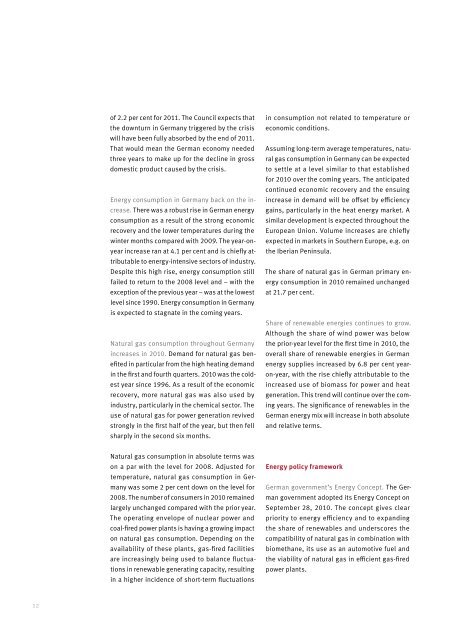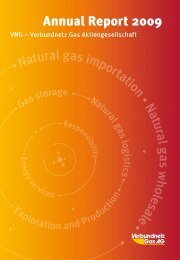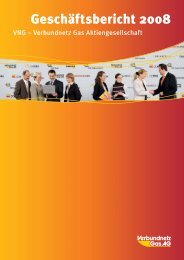Annual Report 2010 311 - Verbundnetz Gas AG
Annual Report 2010 311 - Verbundnetz Gas AG
Annual Report 2010 311 - Verbundnetz Gas AG
You also want an ePaper? Increase the reach of your titles
YUMPU automatically turns print PDFs into web optimized ePapers that Google loves.
of 2.2 per cent for 2011. The Council expects that<br />
the downturn in Germany triggered by the crisis<br />
will have been fully absorbed by the end of 2011.<br />
That would mean the German economy needed<br />
three years to make up for the decline in gross<br />
domestic product caused by the crisis.<br />
Energy consumption in Germany back on the increase.<br />
There was a robust rise in German energy<br />
consumption as a result of the strong economic<br />
recovery and the lower temperatures during the<br />
winter months compared with 2009. The year-onyear<br />
increase ran at 4.1 per cent and is chiefly attributable<br />
to energy-intensive sectors of industry.<br />
Despite this high rise, energy consumption still<br />
failed to return to the 2008 level and – with the<br />
exception of the previous year – was at the lowest<br />
level since 1990. Energy consumption in Germany<br />
is expected to stagnate in the coming years.<br />
Natural gas consumption throughout Germany<br />
increases in <strong>2010</strong>. Demand for natural gas benefited<br />
in particular from the high heating demand<br />
in the first and fourth quarters. <strong>2010</strong> was the coldest<br />
year since 1996. As a result of the economic<br />
recovery, more natural gas was also used by<br />
industry, particularly in the chemical sector. The<br />
use of natural gas for power generation revived<br />
strongly in the first half of the year, but then fell<br />
sharply in the second six months.<br />
in consumption not related to temperature or<br />
economic conditions.<br />
Assuming long-term average temperatures, natural<br />
gas consumption in Germany can be expected<br />
to settle at a level similar to that established<br />
for <strong>2010</strong> over the coming years. The anticipated<br />
continued economic recovery and the ensuing<br />
increase in demand will be offset by efficiency<br />
gains, particularly in the heat energy market. A<br />
similar development is expected throughout the<br />
European Union. Volume increases are chiefly<br />
expected in markets in Southern Europe, e.g. on<br />
the Iberian Peninsula.<br />
The share of natural gas in German primary energy<br />
consumption in <strong>2010</strong> remained unchanged<br />
at 21.7 per cent.<br />
Share of renewable energies continues to grow.<br />
Although the share of wind power was below<br />
the prior-year level for the first time in <strong>2010</strong>, the<br />
overall share of renewable energies in German<br />
energy supplies increased by 6.8 per cent yearon-year,<br />
with the rise chiefly attributable to the<br />
increased use of biomass for power and heat<br />
generation. This trend will continue over the coming<br />
years. The significance of renewables in the<br />
German energy mix will increase in both absolute<br />
and relative terms.<br />
Natural gas consumption in absolute terms was<br />
on a par with the level for 2008. Adjusted for<br />
temperature, natural gas consumption in Germany<br />
was some 2 per cent down on the level for<br />
2008. The number of consumers in <strong>2010</strong> remained<br />
largely unchanged compared with the prior year.<br />
The operating envelope of nuclear power and<br />
coal-fired power plants is having a growing impact<br />
on natural gas consumption. Depending on the<br />
availability of these plants, gas-fired facilities<br />
are increasingly being used to balance fluctuations<br />
in renewable generating capacity, resulting<br />
in a higher incidence of short-term fluctuations<br />
Energy policy framework<br />
German government’s Energy Concept. The German<br />
government adopted its Energy Concept on<br />
September 28, <strong>2010</strong>. The concept gives clear<br />
priority to energy efficiency and to expanding<br />
the share of renewables and underscores the<br />
compatibility of natural gas in combination with<br />
biomethane, its use as an automotive fuel and<br />
the viability of natural gas in efficient gas-fired<br />
power plants.<br />
12





